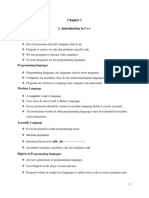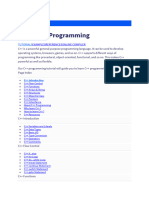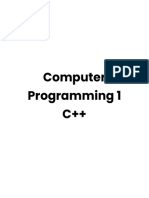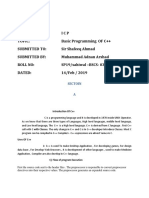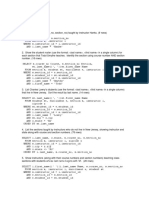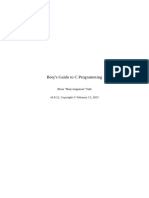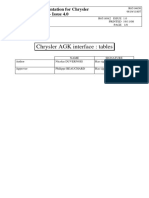Table of Contents
1. C++ "Hello World!" Program ................................................................................................................. 2
2. C++ Comments ...................................................................................................................................... 2
Single Line Comments .......................................................................................................................... 3
3. C++ if...else Statement .......................................................................................................................... 3
4. Printing Numbers From 1 to 5 .............................................................................................................. 4
5. Display a text 5 times ............................................................................................................................ 4
6. Display Numbers from 1 to 5 ................................................................................................................ 5
7. C++ Function Prototype ........................................................................................................................ 5
8. Concatenate String Objects .................................................................................................................. 6
9. Take Inputs from User and Store Them in an Array ............................................................................. 7
10. Display Sum and Average of Array Elements Using for Loop ........................................................... 8
11. Print ASCII Value in C++..................................................................................................................... 9
12. Object and Class in C++ Programming .............................................................................................. 9
13. Using public and private in C++ Class.............................................................................................. 11
14. Working of C++ Pointers ................................................................................................................. 12
15. C++ Multilevel Inheritance .............................................................................................................. 13
16. Multiple Inheritance in C++ Programming...................................................................................... 13
17. Compute quotient and remainder .................................................................................................. 14
18. Find Largest Number Using if...else Statement .............................................................................. 15
19. Find the Factorial of a Given Number ............................................................................................. 16
20. Prefix Increment ++ operator overloading with return type .......................................................... 17
21. Fizz Buzz Implementation in C++ .................................................................................................... 18
22. To Create and Write To a File ......................................................................................................... 19
23. For more :........................................................................................................................................ 19
Page 1 of 19
� 1. C++ "Hello World!" Program
// Your First C++ Program
#include <iostream>
int main() {
std::cout << "Hello World!";
return 0;
}
Output
Hello World!
2. C++ Comments
In this tutorial, we will learn about C++ comments, why we use them, and how
to use them with the help of examples.
C++ comments are hints that a programmer can add to make their code
easier to read and understand. They are completely ignored by C++
compilers.
There are two ways to add comments to code:
// - Single Line Comments
/* */ -Multi-line Comments
Page 2 of 19
�Single Line Comments
In C++, any line that starts with // is a comment. For example,
// declaring a variable
int a;
// initializing the variable 'a' with the value 2
a = 2;
3. C++ if...else Statement
// Program to check whether an integer is positive or negative
// This program considers 0 as a positive number
#include <iostream>
using namespace std;
int main() {
int number;
cout << "Enter an integer: ";
cin >> number;
if (number >= 0) {
cout << "You entered a positive integer: " << number << endl;
}
else {
cout << "You entered a negative integer: " << number << endl;
}
cout << "This line is always printed.";
return 0;
}
Output 1
Page 3 of 19
�Enter an integer: 4
You entered a positive integer: 4.
This line is always printed.
4. Printing Numbers From 1 to 5
#include <iostream>
using namespace std;
int main() {
for (int i = 1; i <= 5; ++i) {
cout << i << " ";
}
return 0;
}
Output
1 2 3 4 5
5. Display a text 5 times
// C++ Program to display a text 5 times
#include <iostream>
using namespace std;
int main() {
for (int i = 1; i <= 5; ++i) {
cout << "Hello World! " << endl;
}
return 0;
}
Output
Hello World!
Hello World!
Page 4 of 19
�Hello World!
Hello World!
Hello World!
6. Display Numbers from 1 to 5
// C++ Program to print numbers from 1 to 5
#include <iostream>
using namespace std;
int main() {
int i = 1;
// while loop from 1 to 5
while (i <= 5) {
cout << i << " ";
++i;
}
return 0;
}
Output
1 2 3 4 5
7. C++ Function Prototype
// using function definition after main() function
// function prototype is declared before main()
#include <iostream>
using namespace std;
// function prototype
int add(int, int);
Page 5 of 19
�int main() {
int sum;
// calling the function and storing
// the returned value in sum
sum = add(100, 78);
cout << "100 + 78 = " << sum << endl;
return 0;
}
// function definition
int add(int a, int b) {
return (a + b);
}
Output
100 + 78 = 178
8. Concatenate String Objects
#include <iostream>
using namespace std;
int main()
{
string s1, s2, result;
cout << "Enter string s1: ";
getline (cin, s1);
cout << "Enter string s2: ";
getline (cin, s2);
result = s1 + s2;
cout << "Resultant String = "<< result;
Page 6 of 19
� return 0;
}
Output
Enter string s1: C++ Programming
Enter string s2: is awesome.
Resultant String = C++ Programming is awesome.
9. Take Inputs from User and Store Them in
an Array
#include <iostream>
using namespace std;
int main() {
int numbers[5];
cout << "Enter 5 numbers: " << endl;
// store input from user to array
for (int i = 0; i < 5; ++i) {
cin >> numbers[i];
}
cout << "The numbers are: ";
// print array elements
for (int n = 0; n < 5; ++n) {
cout << numbers[n] << " ";
}
return 0;
}
Output
Enter 5 numbers:
Page 7 of 19
�11
12
13
14
15
The numbers are: 11 12 13 14 15
10. Display Sum and Average of Array
Elements Using for Loop
#include <iostream>
using namespace std;
int main() {
// initialize an array without specifying size
double numbers[] = {7, 5, 6, 12, 35, 27};
double sum = 0;
double count = 0;
double average;
cout << "The numbers are: ";
// print array elements
// use of range-based for loop
for (const double &n : numbers) {
cout << n << " ";
// calculate the sum
sum += n;
// count the no. of array elements
++count;
}
// print the sum
cout << "\nTheir Sum = " << sum << endl;
Page 8 of 19
� // find the average
average = sum / count;
cout << "Their Average = " << average << endl;
return 0;
}
Output
The numbers are: 7 5 6 12 35 27
Their Sum = 92
Their Average = 15.3333
11. Print ASCII Value in C++
#include <iostream>
using namespace std;
int main() {
char c;
cout << "Enter a character: ";
cin >> c;
cout << "ASCII Value of " << c << " is " << int(c);
return 0;
}
Output
Enter a character: p
ASCII Value of p is 112
12. Object and Class in C++ Programming
// Program to illustrate the working of
// objects and class in C++ Programming
#include <iostream>
Page 9 of 19
�using namespace std;
// create a class
class Room {
public:
double length;
double breadth;
double height;
double calculateArea() {
return length * breadth;
}
double calculateVolume() {
return length * breadth * height;
}
};
int main() {
// create object of Room class
Room room1;
// assign values to data members
room1.length = 42.5;
room1.breadth = 30.8;
room1.height = 19.2;
// calculate and display the area and volume of the room
cout << "Area of Room = " << room1.calculateArea() << endl;
cout << "Volume of Room = " << room1.calculateVolume() << endl;
return 0;
}
Output
Area of Room = 1309
Volume of Room = 25132.8
Page 10 of 19
� 13. Using public and private in C++ Class
// Program to illustrate the working of
// public and private in C++ Class
#include <iostream>
using namespace std;
class Room {
private:
double length;
double breadth;
double height;
public:
// function to initialize private variables
void initData(double len, double brth, double hgt) {
length = len;
breadth = brth;
height = hgt;
}
double calculateArea() {
return length * breadth;
}
double calculateVolume() {
return length * breadth * height;
}
};
int main() {
// create object of Room class
Room room1;
// pass the values of private variables as arguments
room1.initData(42.5, 30.8, 19.2);
cout << "Area of Room = " << room1.calculateArea() << endl;
cout << "Volume of Room = " << room1.calculateVolume() << endl;
Page 11 of 19
� return 0;
}
Output
Area of Room = 1309
Volume of Room = 25132.8
14. Working of C++ Pointers
#include <iostream>
using namespace std;
int main() {
int var = 5;
// declare pointer variable
int* pointVar;
// store address of var
pointVar = &var;
// print value of var
cout << "var = " << var << endl;
// print address of var
cout << "Address of var (&var) = " << &var << endl
<< endl;
// print pointer pointVar
cout << "pointVar = " << pointVar << endl;
// print the content of the address pointVar points to
cout << "Content of the address pointed to by pointVar (*pointVar) = " <<
*pointVar << endl;
return 0;
}
Page 12 of 19
�Output
var = 5
Address of var (&var) = 0x61ff08
pointVar = 0x61ff08
Content of the address pointed to by pointVar (*pointVar) = 5
15. C++ Multilevel Inheritance
#include <iostream>
using namespace std;
class A {
public:
void display() {
cout<<"Base class content.";
}
};
class B : public A {};
class C : public B {};
int main() {
C obj;
obj.display();
return 0;
}
Output
Base class content.
16. Multiple Inheritance in C++ Programming
#include <iostream>
Page 13 of 19
�using namespace std;
class Mammal {
public:
Mammal() {
cout << "Mammals can give direct birth." << endl;
}
};
class WingedAnimal {
public:
WingedAnimal() {
cout << "Winged animal can flap." << endl;
}
};
class Bat: public Mammal, public WingedAnimal {};
int main() {
Bat b1;
return 0;
}
Output
Mammals can give direct birth.
Winged animal can flap.
17. Compute quotient and remainder
#include <iostream>
using namespace std;
int main()
{
int divisor, dividend, quotient, remainder;
cout << "Enter dividend: ";
cin >> dividend;
cout << "Enter divisor: ";
Page 14 of 19
� cin >> divisor;
quotient = dividend / divisor;
remainder = dividend % divisor;
cout << "Quotient = " << quotient << endl;
cout << "Remainder = " << remainder;
return 0;
}
Output
Enter dividend: 13
Enter divisor: 4
Quotient = 3
Remainder = 1
18. Find Largest Number Using if...else
Statement
#include <iostream>
using namespace std;
int main() {
float n1, n2, n3;
cout << "Enter three numbers: ";
cin >> n1 >> n2 >> n3;
if((n1 >= n2) && (n1 >= n3))
cout << "Largest number: " << n1;
else if ((n2 >= n1) && (n2 >= n3))
cout << "Largest number: " << n2;
else
cout << "Largest number: " << n3;
return 0;
}
Page 15 of 19
�Output
Enter three numbers: 2.3
8.3
-4.2
Largest number: 8.3
19. Find the Factorial of a Given Number
#include <iostream>
using namespace std;
int main() {
int n;
long factorial = 1.0;
cout << "Enter a positive integer: ";
cin >> n;
if (n < 0)
cout << "Error! Factorial of a negative number doesn't exist.";
else {
for(int i = 1; i <= n; ++i) {
factorial *= i;
}
cout << "Factorial of " << n << " = " << factorial;
}
return 0;
}
Output
Enter a positive integer: 4
Factorial of 4 = 24
Page 16 of 19
� 20. Prefix Increment ++ operator overloading
with return type
#include <iostream>
using namespace std;
class Check
{
private:
int i;
public:
Check(): i(0) { }
// Return type is Check
Check operator ++()
{
Check temp;
++i;
temp.i = i;
return temp;
}
void Display()
{ cout << "i = " << i << endl; }
};
int main()
{
Check obj, obj1;
obj.Display();
obj1.Display();
obj1 = ++obj;
obj.Display();
obj1.Display();
return 0;
}
Page 17 of 19
�Output
i = 0
i = 0
i = 1
i = 1
21. Fizz Buzz Implementation in C++
#include <iostream>
using namespace std;
int main(){
for (int i=1; i<=100; i++){
if (i%15 == 0)
cout<<"Fizz Buzz,\t";
else if ((i%3) == 0)
cout<<"Fizz,\t";
else if ((i%5) == 0)
cout<<"Buzz,\t";
else
cout<<i<<",\t";
}
return 0;
}
Output
1, 2, Fizz, 4, Buzz, Fizz, 7, 8, Fizz, Buzz, 11, Fizz, 13, 14, Fizz Buzz, 16, 17, Fizz, 19, Buzz, Fizz,
22,
23, Fizz, Buzz, 26, Fizz, 28, 29, Fizz Buzz, 31, 32, Fizz, 34, Buzz, Fizz, 37, 38, Fizz, Buzz, 41, Fizz,
43,
44, Fizz Buzz, 46, 47, Fizz, 49, Buzz, Fizz, 52, 53, Fizz, Buzz, 56, Fizz, 58, 59, Fizz Buzz, 61, 62,
Fizz,
64, Buzz, Fizz, 67, 68, Fizz, Buzz, 71, Fizz, 73, 74, Fizz Buzz, 76, 77, Fizz, 79, Buzz, Fizz, 82, 83,
Fizz,
Buzz, 86, Fizz, 88, 89, Fizz Buzz, 91, 92, Fizz, 94, Buzz, Fizz, 97, 98, Fizz, Buzz,
Page 18 of 19
� 22. To Create and Write To a File
#include <iostream>
#include <fstream>
using namespace std;
int main() {
// Create and open a text file
ofstream MyFile("filename.txt");
// Write to the file
MyFile << "Files can be tricky, but it is fun enough!";
// Close the file
MyFile.close();
}
23. For more :
visit the following recommended sites:
https://www.w3schools.com/cpp/default.asp
https://www.tutorialspoint.com/cplusplus/index.htm
https://www.programiz.com/cpp-programming
Page 19 of 19




